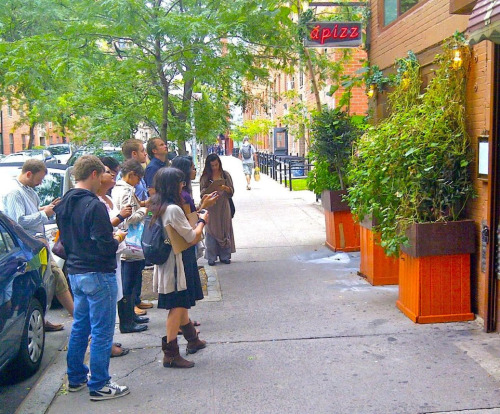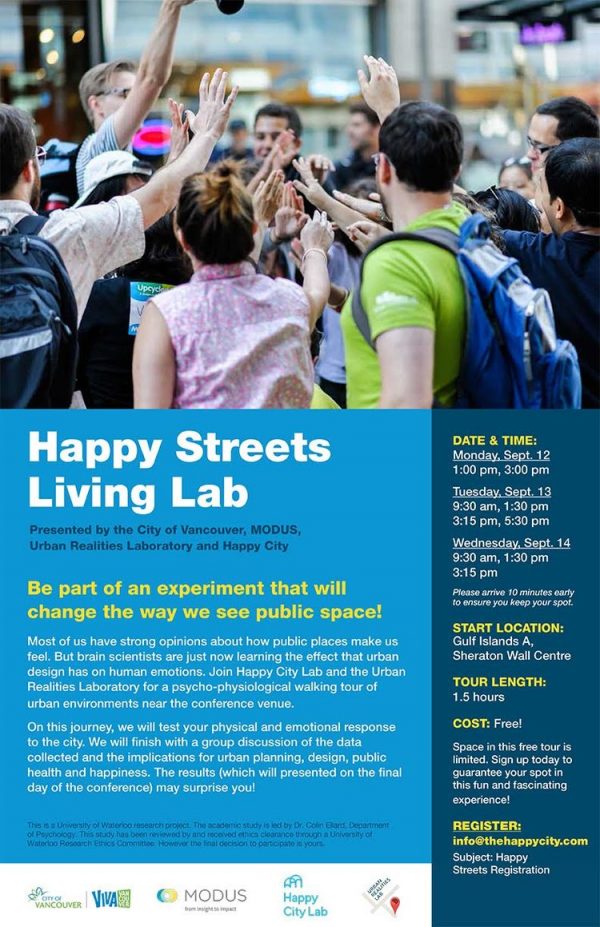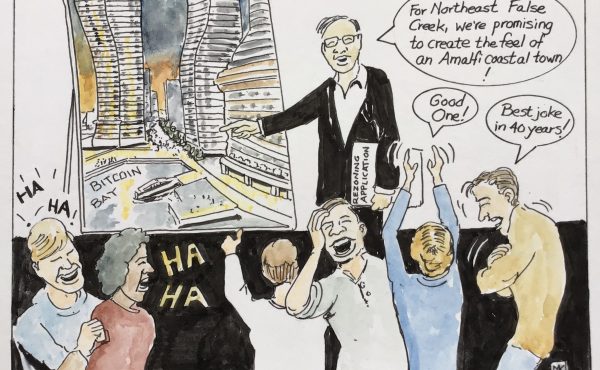Around the world, city streets are being transformed into better places to walk, socialize and celebrate. But how do these changes influence the way we feel and how we treat other people?
Happy Streets Living Lab: Presented by City of Vancouver, MODUS, Urban Realities Laboratory and Happy City Lab is an experiment that will take place during Project for Public Space’s Pro Walk/Pro Bike/Pro Place conference on September 12 – 14, 2016.
The Happy Streets Living Lab will combine research rigor with fun tours of Vancouver, where participants learn about their own physical and emotional responses to the city. It is a valuable opportunity to bring people from around the world together to learn best practices in creating happy spaces that promote social interaction and build trust. The project partners are excited to share this innovative project with conference attendees.
“We believe that great public spaces have the ability to foster deep engagement and connections to one’s community, while also generating feelings of well-being. It will be fascinating to see these beliefs put to the test in the Happy Streets Living Lab,” said Vince Verlaan, MODUS Principal and Engagement Specialist. “This research aligns with our objective of creating a lasting legacy of healthy, sustainable and prosperous  communities.”
communities.”
The Happy Streets Living Lab is part of a University of Waterloo research project, led by Dr. Colin Ellard, Director of the Urban Realities Laboratory at the University of Waterloo. The Laboratory has conducted similar studies in Manhattan, Brooklyn, Berlin, Mumbai and Toronto as a part of its mandate to understand the influence of urban design on the psychological state of urban residents.
“We are very excited to share our methodology in Vancouver and to further explore its potential for understanding how the design of city streets can influence urban life,” said Dr. Ellard.
Each tour will end with a group discussion of the data collected during the tour and the implications for urban planning, and public health and safety. Preliminary results from all the tours will then be shared with conference participants in a plenary session.
“This conference is the ideal setting to continue refining and building on the psycho-physiological experiments that began in New York and continued in Berlin. The opportunity to conduct this public space experiment with 90 of the world’s leading urbanists – and to share the results with 1000+ of them – in Vancouver, my home, is invaluable,” said Charles Montgomery, Principal at Happy City Lab and author of Happy City.
Space for this free experiment is limited. People are encouraged to register now and participate in this groundbreaking public space research.
***
About the Happy Streets Living Lab Partners:
MODUS Planning, Design & Engagement is a 15-person Vancouver-based firm specializing in community planning, urban design and public engagement. By moving “from insight to impact,” we work with a wide range of private and public sector clients to explore address the challenges and opportunities of our time, with a strong focus on collaboration, co-creation, and action.
The City of Vancouver is proud to support the Happy Streets Living Lab through VIVA Vancouver, a program that transforms road spaces into vibrant pedestrian spaces. In collaboration with community groups, local businesses, and regional partners, VIVA facilitates short- and long-term street closures throughout the year, creating public spaces for walking, lounging, and lunching. These spaces enhance the city’s sense of community, encourage walking and cycling, and benefit local businesses.
Urban Realities Laboratory studies the impact of urban design on human psychology. We employ a wide variety of methods ranging from field studies of behaviour in urban and architectural settings to the use of immersive virtual reality to test predictions about urban behaviour in simulations. Urban Reality Laboratory’s goals are both to contribute to theory in environmental psychology and to develop tools that can be applied to specific problems and issues relating to the psychology of the built environment.
Happy City is a consulting group that helps build happiness into neighborhoods and cities through research, public events, and collaborative consulting. Our work is grounded in evidence from psychology, neuroscience, public health, and behavioral economics. To learn more about this work, please see the book, Happy City: Transforming Our Lives Through Urban Design, written by award-winning author and Happy City principal, Charles Montgomery.



